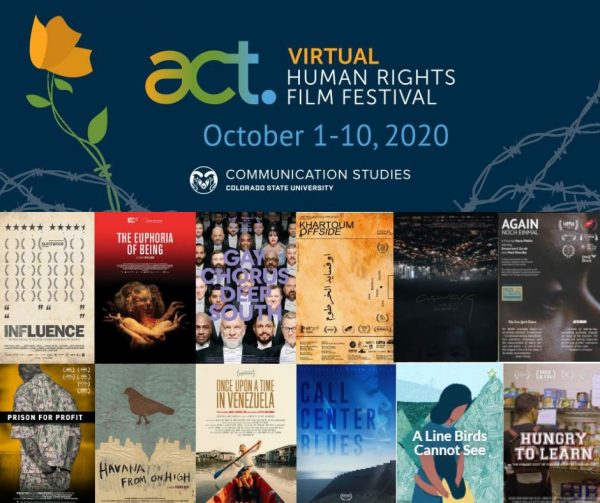 In March 2020, the ACT Human Rights Film Festival became one of the first festivals in the nation to announce that its annual festival – set to open April 3 – was postponed until further notice.
In March 2020, the ACT Human Rights Film Festival became one of the first festivals in the nation to announce that its annual festival – set to open April 3 – was postponed until further notice.
The postponement was announced after ACT had released the film program and sold tickets and passes. ACT’s festival programmers and staff determined that cancelling the 2020 festival seemed ill-advised and unnecessary. Instead, ACT Managing Director Beth Seymour got busy re-imagining how to honor filmmakers and continue building community connections.
In May 2020, Seymour launched “ACT at Home,” a series of free, live streaming conversations featuring directors and producers of a handful of short films that were programmed for ACT’s 10-day festival. Five of the short films ACT selected for its 5th edition were made the films publicly available for a limited time. ACT audiences could watch the shorts whenever it worked for them before joining a livestreamed filmmaker Q&A facilitated by an ACT host. Recordings of conversations were subsequently uploaded to the ACT YouTube channel.
“ACT at Home let us experiment with navigating virtual spaces,” Seymour says. The format allowed the ACT team to learn about the technical issues facing audience members, whether participating in a livestream Q&A had any appeal.
“I think people were – and still are – craving culture and connection,” Seymour says. “I think it’s important to hold on to what keeps us connected as humans. ACT has always valued the conversations that films spark. Both help us understand ourselves and our world.”
Fifth ACT Human Rights Film Festival – October 2020
 By late summer 2020, the ACT team had re-imagined the fifth annual festival as a fully virtual event. From October 1 through October 10, ACT renegotiated with filmmakers and distributors to virtually screen nearly all the originally programmed films – with access to audience members anywhere in the United States.
By late summer 2020, the ACT team had re-imagined the fifth annual festival as a fully virtual event. From October 1 through October 10, ACT renegotiated with filmmakers and distributors to virtually screen nearly all the originally programmed films – with access to audience members anywhere in the United States.
The October festival featured 22 feature length and short documentary films from eleven countries. Each of the feature films included a filmmaker Q&A with seven prerecorded conversations and seven livestreamed events.
“While none of us imagined in early 2020 how many things would change in the coming months, we were thrilled and inspired to pivot to a digital platform that sustained our artistic program and inspired conversations,” Seymour said. “We were honored and excited to see how many audience members joined us from all corners of the U.S.”
Overall, more than 971 households joined from 26 U.S. states for ACT’s fifth edition. The festival’s filmmaker Q&As were posted online on ACT’s YouTube channel for viewing.
Sixth ACT Human Rights Film Festival – March 2021
 Encouraged by the reach and volume of viewers to the 2020 virtual festival, ACT staff and programmers moved forward with selecting 21 films for the sixth festival. The festival took place March 19-27 fully online and featured nine filmmaker Q&As.
Encouraged by the reach and volume of viewers to the 2020 virtual festival, ACT staff and programmers moved forward with selecting 21 films for the sixth festival. The festival took place March 19-27 fully online and featured nine filmmaker Q&As.
“Just as we have done ever since the 2016 inaugural festival, the members of ACT’s programming committee selected some of the most accomplished and inspiring examples of nonfiction filmmaking from the past year,” said. ACT program director Professor Scott Diffrient. “The majority of films in this year’s lineup were directed or codirected by women.”
The spring festival drew more participants and a significant increase in the number of passholders compared to fall. Overall, 1,021 households joined ACT from 20 U.S. states.
Alumni Support
Several Communication Studies alumni helped make the 2020 and 2021 ACT Human Rights Film Festivals a success. Notably, speech communication alumnus Dan Clemens (‘90) helped ACT secure donations by offering matching grants in both 2020 and 2021.
ACT also partnered with the CSU Association to screen a short film by speech communication alumnus Anthony Grimes (‘07) during an “Alumni Night In” event that occurred mid-festival. Grimes executive produced “Mr. Somebody,” which premiered at Tribeca Film Festival in 2020. The 14-minute film was among the most watched in the sixth festival. The livestreamed filmmaker Q&A with CSU Alumni Association moderator Tanara Landor drew nearly 100 households and lively questions from audience members.
Looking forward
ACT Human Rights Film Festival has begun planning for the seventh festival that will occur in spring 2022. The goal is to draw from the rich experiences from the past six years and create a lively, vibrant, and accessible event that coalesces lessons learned from both the virtual and in-person events.
To stay up-to-date on ACT’s happenings. Sign up for the newsletter or follow ACT on Facebook, Instagram, or Twitter (@actfilmfest).